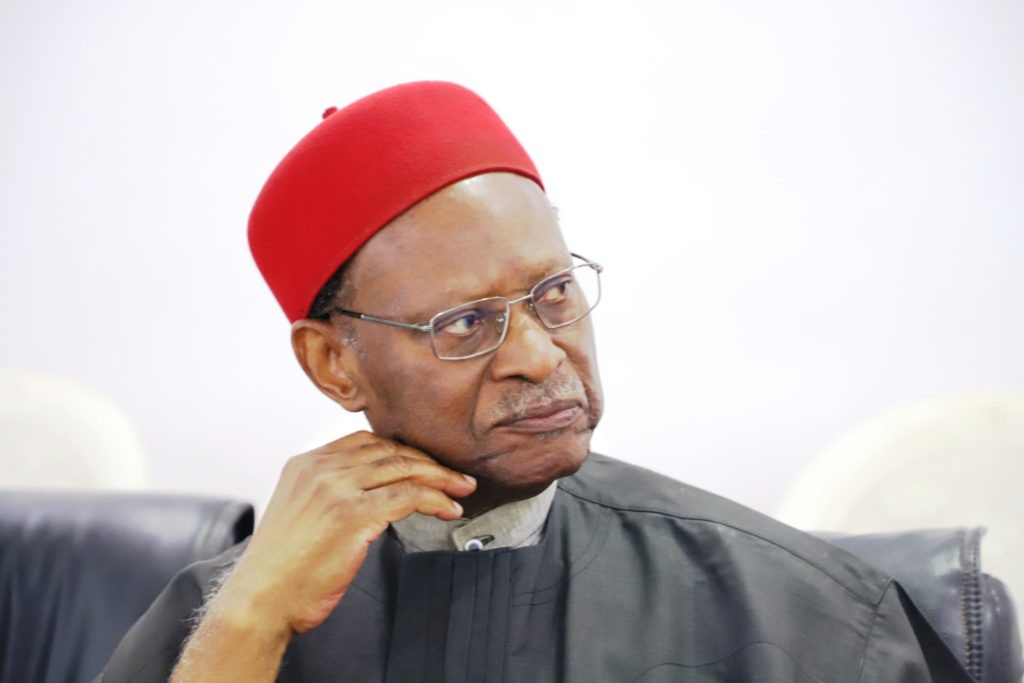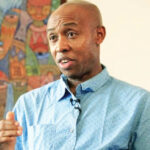Former Commonwealth Secretary General, Chief Emeka Anyaoku, has advised the federal government to stop tinkering with the 1999 Constitution, urging the presidency to work with the National Assembly to come up with a new one that can address the deteriorating situation in the country.
The elderly statesman lamented that Nigeria’s unity in diversity began to degenerate during the military takeover, saying the country needed a system of government to reverse the disturbing trend.
Chief Anyaoku gave the advice on Friday while delivering a speech titled, “Management of Diversity: A Major Challenge to Governance in Democratic Countries,” at the 11th convocation ceremony of Afe Babalola University, Ado-Ekiti (ABUAD) in Ekiti State.
He said the theme was informed by his over 34 years of working closely with the governments of the 54, (now 56) member countries of the Commonwealth and its relevance to the current situation in Nigeria.
He explained that nations succeeded in managing their diversity by making efforts to structure their national constitutions and pursue governance policies that deal with the problems arising from the diverse populations of their countries.
BREAKING: Tinubu appoints new Auditor-General of the Federation
Tinubu orders release of lecturers’ salaries withheld over ASUU strike
The seasoned diplomat cited diverse countries like India, the United Kingdom and Canada where the efforts succeeded and nations such as Yugoslavia, Chekoslavakia, and Sudan where they failed. He said in climes such as Turkey and Nigeria, the efforts remained work in progress.
Taking a trip down memory lane, Chief Anyaoku recalled that the regional government engendered healthy competition that birthed remarkable developments across the regions, adding that early post-independence, Nigeria’s diversity was a source of strength that inspired national unity.
He said, “I now come to our own country, Nigeria, which is a diverse country whose main component parts had lived separately for centuries in their respective areas with their different cultures. Given the nature and geography of its component parts Nigeria, we must admit, is a good example of what the late eminent Harvard political science professor, Samuel P. Huntington, called a cleft society in his 1993 magnum opus, The Clash of Civilisations and the Remaking of World Order.
“It is an undeniable fact that Nigeria’s diversity was more successfully managed in the early years of the country’s independence. During that period, Nigeria’s diversity was perceived by all as a source of strength and inspirer of national unity. There were no inter-regional tensions, and in the perception and conduct of its citizens the country had begun to evolve into a nation that was credibly aspiring to realize its huge potential. But all this changed when the military intervened in the country’s governance in January 1966 and changed the existing constitution.
“Under the Constitution of fewer and more viable federating units that we had before the military intervention, there was security of life and property, and there was a faster pace of economic development in the regions. During that halcyon period, the regional premiers and federal government officers were utilizing their limited resources more efficiently and effectively. Revenues from cocoa produce were used by the Premier Chief Obafemi Awolowo for landmark projects and programmes including free education in the Western region. Revenues from palm produce were utilized by Premier Dr Michael Okpara to build industries, finance education and develop agriculture in the Eastern region.
“In the Midwest region, Premier Chief Denis Osadebay expanded the region’s economy with revenues from rubber, timber, and palm produce. And in the Northern region, the Premier Sir Ahmadu Bello used money from the region’s groundnut pyramids, hides and skin and cotton exports to build industries in Kano, Kaduna, and elsewhere.
“The regions also engaged in healthy competition which facilitated rapid development across the country. When the Eastern Nigerian Government built Nigeria’s first autonomous university in Nsukka in 1960, the Western Region followed by establishing the University of Ife at Ile- Ife in 1962, and the Northern Region built Ahmadu Bello University at Zaria, also in 1962.”
Chief Anyaoku observed that during the period, Nigeria’s national stability and fast-paced economic growth won it respect and admiration globally, and its green passport was universally respected.
“In contrast today, if truth be told, the situation inside our country is lamentable. There is unprecedented level of divisiveness and declining sense of national unity, the economy is in doldrums with 133 million of our population in multidimensional poverty, there is great insecurity throughout the land as we hear every day of killings and kidnappings by unknown gunmen and marauding bandits, all our infrastructure including power supply, roads and educational and health facilities are in poor state,” he lamented.
The first African Commonwealth secretary general also decried what he described as complete bastardization of societal values and an unfathomable level of corruption evident in the massive looting and mismanagement of national resources, including unbridled theft of crude oil. He, however, saw light at the end of the tunnel.
How to transform Nigeria
“I believe that Nigeria is still salvageable. The country can still be restored to greater peace, greater security, to a renewed sense of national unity, to greater political stability, and to a more assured pace of economic development. As we all know, there is an abundance of expert analyses and prescriptions of how to resolve Nigeria’s individual problems.
“But the crux of my submission is that, considering our history over the last 63 years, to arrest the ongoing deterioration of the situation in the country, and to achieve the desired transformation for the better, we need a system of government that not only addresses our diversity, but is also based on a constitution that can correctly be described as a Nigerian people’s Constitution.
“Accordingly, I call on the Presidency in consultation with the National Assembly, instead of continuing to tinker with the 1999 Constitution, to acknowledge the urgent necessity of a new Constitution to be made by the people of Nigeria. To this end, I invite the Federal Government to immediately embark on the following practical steps,” Anyaoku said.
He advised the federal government to convene a National Constituent Assembly comprising 362 representatives directly elected on a non-party basis to discuss and agree a new constitution, taking into account the 1963 and the 1999 constitutions as well as the recommendations of the 2014 national conference.
The diplomat added that the elected representatives – 10 each from the 36 states and two from the FCT – should be assisted by 37 lawyers, each drawn from the 36 states and the FCT.
“The management of the work of the Constituent Assembly should be entrusted to a six-member Steering Committee of equal individual powers (possibly the 2 co-chairmen, 2 vice co-chairmen, 2 joint-secretaries) elected from each of the six geopolitical zones by members of the Assembly themselves.
“The Constituent Assembly should be given six months to draft the new Constitution. The agreed draft Constitution should be put to a national referendum for adoption by a majority of the voters, after which it should be signed by the President.
“In my view, the essence of the new Constitution should, in recognition of the crucial principle of subsidiarity in every successful federation, involve a devolution of powers from the central government to fewer and more viable federating units with strong provisions for inclusive governance at the centre and in the regions as was agreed by Nigeria’s founding fathers,” he stated.
Chief Anyaoku maintained that Nigeria, as the largest black nation on earth, needed to play big on the global stage, saying after putting our domestic situation right, the presidency and the Ministry of Foreign Affairs should work hard to elevate Nigeria’s standing in the comity of nations.
He urged the citizens to join in earning a deserving international reputation for the country through their exemplary behaviour and membership of relevant global organizations.
“In conclusion, I would like to stress my belief that if properly managed, Nigeria’s diversity will become an asset and not a liability, and thus prove that Nigeria is a tapestry, a beautiful mosaic, and above all, a miracle waiting to happen,” he added.
Earlier, the elder statesman described the Founder and Chancellor of ABUAD, Aare Afe Babalola, as “a Nigerian iconographic figure” whose foresight ensured that the 13-year-old university was steeped in the tradition of excellence.
He congratulated the graduating students and urged them to always remember the university’s motto: ‘labour, service and integrity’ by seeking self-fulfillment through initiatives and hard work amid the scourge of youth unemployment in Nigeria.

 Join Daily Trust WhatsApp Community For Quick Access To News and Happenings Around You.
Join Daily Trust WhatsApp Community For Quick Access To News and Happenings Around You.



